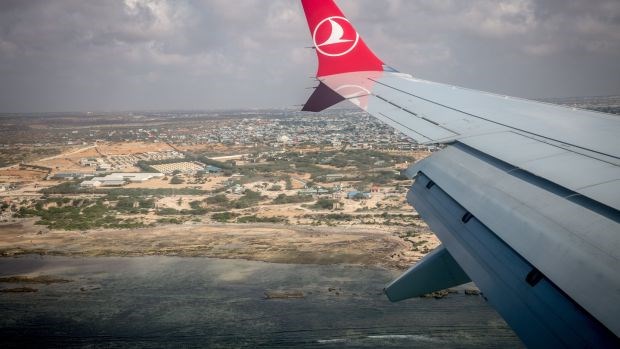
Monday April 25, 2022
By Sally Hayden
Mogadishu Letter: On the other side of the barriers, millions of Somalis live with the daily threat of violence
The view from a hotel in the Halane Base Camp, Mogadishu. Photograph: Sally Hayden
What’s it like to fly into one of the most dangerous cities in the world? In the case of Mogadishu, the experience is extraordinarily beautiful.
The Turkish Airlines commercial flight I was on, which had taken just under seven hours from Istanbul, looped out over the speckled light blue and turquoise sea before turning back towards the coast. I spotted fishing boats underneath, and the white crest of waves as they hit Somalia’s long shoreline.
We landed on the runway at Aden Adde International Airport. Outside, peacekeepers and local security forces manned checkpoints. The streets were relatively clear, as a result of the airport being in a closed off military base.
I was already aware that there were two Mogadishus: or rather, the real Mogadishu and the Halane Base Camp, which stretches for kilometres, housing diplomats, foreign aid workers and other non-Somalis. It is heavily fortified, and Somalis who work there during the day say they can spend an hour or more going through security screenings to get in. Some outside even condemn the camp as an occupation.
In a short film titled The Wall, filmmaker Roopa Gogineni captured the interdependent but separate communities: the wealthy foreigners who are protected but removed; while, on the other side of the barriers, millions of Somalis live with the daily threat of violence. Halane is so guarded that Somali fishermen are stopped from fishing off the coast from it – one told Gogineni he was “terrorised”, his boat “split in two” as he was chased by peacekeepers.
Elsewhere, in Mogadishu, her film shows Prof Mohamed Doob teaching a class about the civil war that broke out more than three decades ago. Then came international intervention during which, Doob says, “unfortunately, no one strived to know what the Somalis wanted”.
“In my opinion,” says one of his female students in response, “those people in Halane are afraid of us and we are also afraid of them. This is because they cannot interact with the community and we know nothing about them.”
On my first day in Halane, the sound of gunfire echoed regularly in the distance. “It’s just exercises,” said a security officer.

The approach to Mogadishu, Somalia. Photograph: Sally Hayden
The week I visited parliamentarians were scheduled to be sworn in inside Halane, so it was put on lockdown for six days.
Traders were prevented from working and extra checkpoints sprang into action, with the newly renamed peacekeeping mission – now the African Union Transitional Mission in Somalia – saying it was “conducting [a] security exercise”. A hotel owner apologised for rooms not being ready; none of his staff had made it to work.
Other Somalis employed in Halane decided to sleep there, knowing that if they left security procedures might mean they could not re-enter. Some told me they faced potential retaliation from Islamic militant group Al Shabaab, so even outside they choose homes in “safe” locations. But they were still keen for me to understand that Somalia is not all negativity.
At the same time, a dispute between Somalia’s prime minister and president raged over whether Francisco Madeira, the African Union chair’s special representative for Somalia, should be declared a persona non grata. One consequence was that the UN terminal in the airport was shut down, and my onwards flight to southwest Somalia could not depart.
The result was an extra day working on a laptop in Mogadishu and an evening sitting by a swimming pool, where interesting people walked by: a smiling Kenyan woman with a kalashnikov slung over her shoulder; international airline pilots; local logistics managers; a Somali millionaire who boasted of his lucrative deals with the US government.
Passing through Halane on the way out of Somalia came with similar problems. The morning of my flight back from the countryside, several mortars were fired towards the Kenyan embassy (no one was hurt). There were reports of gunfire by the airport runway. We landed without further incident.